"Biography". Dictionnaire des parlementaires du Québec de 1792 à nos jours (in French). National Assembly of Quebec.
Sydney Robert Bellingham | |
|---|---|
| Member of the Legislative Assembly of Quebec for Argenteuil | |
| In office 1867–1878 |
| International | |
|---|---|
| National | |
"Biography". Dictionnaire des parlementaires du Québec de 1792 à nos jours (in French). National Assembly of Quebec.
Sydney Robert Bellingham | |
|---|---|
| Member of the Legislative Assembly of Quebec for Argenteuil | |
| In office 1867–1878 |
| International | |
|---|---|
| National | |

Sir John Joseph Caldwell Abbott was a Canadian lawyer and politician who served as the third prime minister of Canada from 1891 to 1892. He held office as the leader of the Conservative Party.
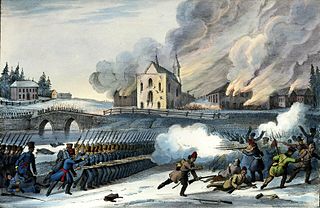
The Lower Canada Rebellion, commonly referred to as the Patriots' Rebellion in French, is the name given to the armed conflict in 1837–38 between rebels and the colonial government of Lower Canada. Together with the simultaneous rebellion in the neighbouring colony of Upper Canada, it formed the Rebellions of 1837–38.

Events from the year 1832 in Canada.
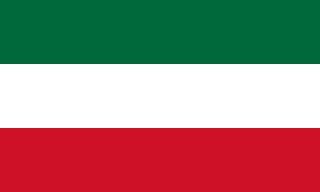
The Parti canadien or Parti patriote was a primarily francophone political party in what is now Quebec founded by members of the liberal elite of Lower Canada at the beginning of the 19th century. Its members were made up of liberal professionals and small-scale merchants, including François Blanchet, Pierre-Stanislas Bédard, John Neilson, Jean-Thomas Taschereau, James Stuart, Louis Bourdages, Denis-Benjamin Viger, Daniel Tracey, Edmund Bailey O'Callaghan, Andrew Stuart and Louis-Joseph Papineau.
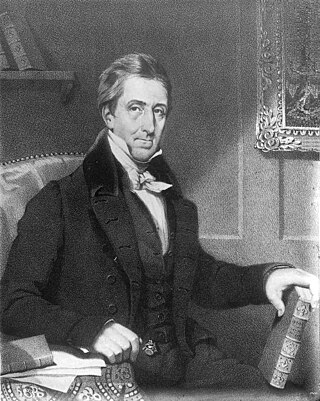
Denis-Benjamin Viger was a 19th-century politician, lawyer, and newspaper publisher in Lower Canada, who served as joint premier of the Province of Canada for over two years. A leader in the Patriote movement, he was a strong French-Canadian nationalist, but a social conservative in terms of the seigneurial system and the position of the Catholic church in Lower Canada.

Augustin-Norbert Morin was a Canadien journalist, lawyer, politician, and rebel in Lower Canada. He was a member of the Legislative Assembly of Lower Canada in the 1830s, as a leading member of the Parti patriote. Although he participated in the Lower Canada Rebellion, the British authorities concluded his conduct did not warrant a charge of high treason. After the Rebellion, he entered politics in the Province of Canada, eventually becoming joint premier of the Province. Retiring from politics due to health concerns, Morin was appointed to the bench. He was one of the commissioners who codified the law of Lower Canada, producing the Civil Code of Lower Canada which stayed in force for over a century.
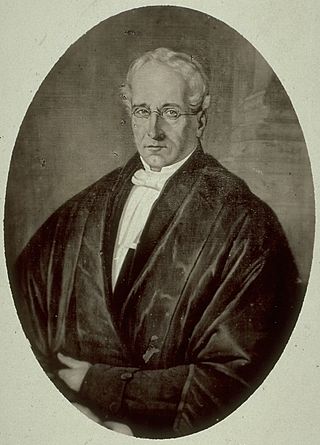
Austin Cuvillier was a businessman and political figure in Lower Canada and Canada East. He was a successful Canadien businessmen, unusual when most businessmen in Lower Canada were British. He also was a member of the Legislative Assembly of Lower Canada for twenty years, as a member for the Parti canadien, which tended to oppose the policies of the British-appointed governors. As a result, he served as a bridge between the conservative business community, and the more radical Parti canadien, although he finally broke with the Parti canadien prior to the Lower Canada Rebellion of 1837–1838.

Charles Richard Ogden, was a Joint Premier of the Province of Canada for Canada East from 1841 to 1842 with William Henry Draper PM for Canada West. Odgen was a member of the Château Clique, the group of English-speaking officials who supported the Governor General, appointed by the British government. Trained as a lawyer, he developed a lucrative practice at Trois-Rivières and then Montreal. He had a lengthy career as a member of the Legislative Assembly of Lower Canada.
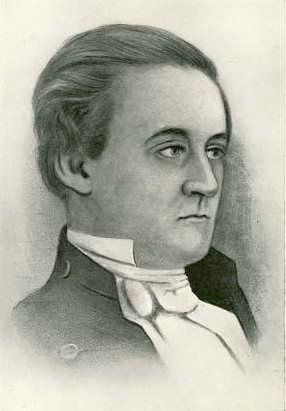
Lewis Thomas Drummond was a lawyer, political figure, and judge in Lower Canada.

Castlebellingham is a village and townland in County Louth, Ireland. The village has become quieter since the construction of the new M1 motorway, which bypasses it. The population of Castlebellingham-Kilsaran increased from 721 inhabitants as of the 2002 census to 1,126 people as of the 2016 census.
Louis Lacoste was a notary and political figure in Lower Canada and then Canada East, Province of Canada. He was a member of the Legislative Assembly of Lower Canada, supporting Louis-Joseph Papineau and the Parti patriote. During the Lower Canada Rebellion he was imprisoned without trial, for his activities in the lead-up to the Rebellion. Following the creation of the Province of Canada, he was a member of the new Legislative Assembly for several years, and then a member of the Legislative Council. He was one of the original members of the Senate of Canada from 1867 to 1878.
Thomas Boutillier was a medical doctor, Patriote, and politician in Lower Canada. Elected to the Legislative Assembly of Lower Canada in 1834, he was a member of the Parti patriote led by Louis-Joseph Papineau, which was challenging the British colonial government of the largely French-speaking province of Lower Canada. When the Lower Canada Rebellion broke out in 1837, he fought on the Patriote side in the Battle of Saint-Charles. Following the Patriotes' defeat, he fled to the United States. He returned to Lower Canada in 1838.
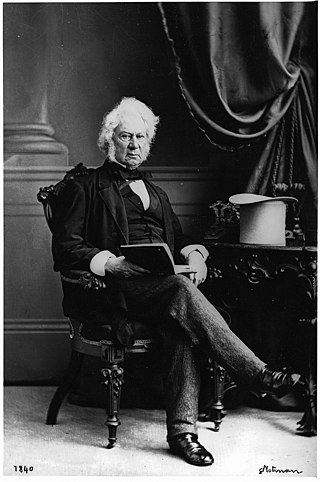
Benjamin Holmes was a Lower Canada businessman and political figure. He served in the militia of Lower Canada during the War of 1812, including a period of captivity by the American forces. He joined the Bank of Montreal shortly after it formed in 1817, and rose to be the cashier by 1827. He was twice a member of the Legislative Assembly of the Province of Canada. In spite of his service in the War of 1812, he was a supporter of annexation by the United States in the late 1840s, and a signatory of the Montreal Annexation Manifesto. He became a vice-president of the Grand Trunk Railway, and also a director of the Bank of Montreal.
Jacob De Witt was a businessman, banker and political figure in Lower Canada and Canada East, Province of Canada. Beginning in the hardware trade, he expanded into steamship transportation on the River St. Lawrence and then banking. He was elected to the Legislative Assembly of Lower Canada and generally supported the Parti patriote, but did not participate in the Lower Canada Rebellion of 1837. After the union of Lower Canada and Upper Canada into the Province of Canada, he was elected to the new Legislative Assembly. He initially supported the reform measures of Louis-Hippolyte LaFontaine, but gradually became more radical, ending his political career as member of the Parti rouge and calling for the voluntary annexation of Canada to the United States. He continued in business, particularly banking, until his death in 1859.
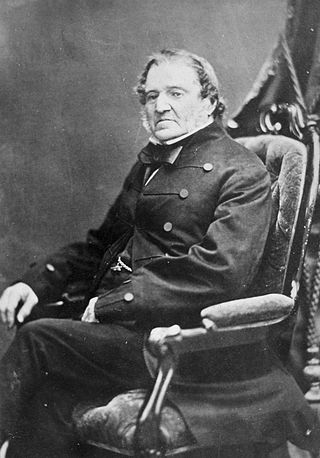
Frédéric-Auguste Quesnel,, was a lawyer, businessman and politician in Lower Canada. He was a member of the Legislative Assembly and the Executive Council of Lower Canada. Following the union of the Canadas, he was elected to the Legislative Assembly of the Province of Canada and later was appointed to the Legislative Council. Throughout his career he was a political moderate, seeking greater political power for French-Canadians under British rule, but also supporting the British connection generally. Condemned by the Patriotes as a vendu ("sell-out") in the Lower Canada Rebellion, in 1860 he was elected President of the Saint-Jean-Baptiste Society of Montreal.

The patriotes movement was a political movement that existed in Lower Canada from the turn of the 19th century to the Patriote Rebellion of 1837 and 1838 and the subsequent Act of Union of 1840. The partisan embodiment of the movement was the Parti patriote, which held many seats in the Legislative Assembly of Lower Canada.

Major Thomas Edmund Campbell C.B., came to Canada East as a British military officer, where he became a political figure and seigneur who did much to develop Rouville, Quebec. He built Manoir Rouville-Campbell, and was a prominent member of the Montreal Hunt.
Sir Alan Henry Bellingham, 4th Baronet, was an Anglo-Irish Conservative Member of Parliament. He was Justice of the Peace, High Sheriff of Louth and Lord Lieutenant of Louth. He was Senator of the Royal University of Ireland and Private Chamberlain to popes Pius IX, Leo XIII and Pius X. He was the father of the diplomat Sir Edward Bellingham, 5th Bt. and the uncle of Sir Evelyn Wrench, editor of The Spectator.
William Holmes (1762–1834), M.D., J.P., was Surgeon-General to the British Forces in Canada; a magistrate and landowner at Quebec.
Michael McCulloch was a physician and political figure in Canada East, Province of Canada. He represented the constituency of Terrebonne in the Legislative Assembly of the Province of Canada from 1841 to 1844, as a Tory and supporter of the British-appointed Governor General, Lord Sydenham.